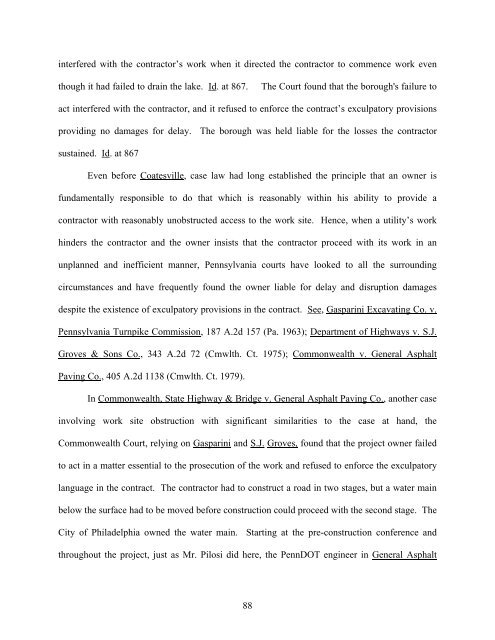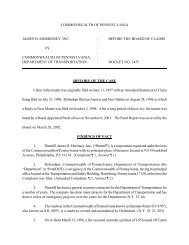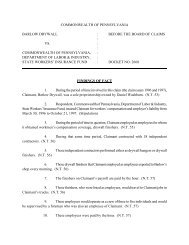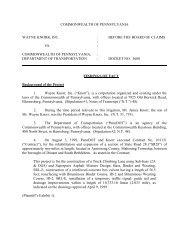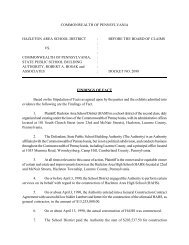3720 - Board of Claims
3720 - Board of Claims
3720 - Board of Claims
You also want an ePaper? Increase the reach of your titles
YUMPU automatically turns print PDFs into web optimized ePapers that Google loves.
interfered with the contractor’s work when it directed the contractor to commence work even<br />
though it had failed to drain the lake. Id. at 867.<br />
The Court found that the borough's failure to<br />
act interfered with the contractor, and it refused to enforce the contract’s exculpatory provisions<br />
providing no damages for delay. The borough was held liable for the losses the contractor<br />
sustained. Id. at 867<br />
Even before Coatesville, case law had long established the principle that an owner is<br />
fundamentally responsible to do that which is reasonably within his ability to provide a<br />
contractor with reasonably unobstructed access to the work site. Hence, when a utility’s work<br />
hinders the contractor and the owner insists that the contractor proceed with its work in an<br />
unplanned and inefficient manner, Pennsylvania courts have looked to all the surrounding<br />
circumstances and have frequently found the owner liable for delay and disruption damages<br />
despite the existence <strong>of</strong> exculpatory provisions in the contract. See, Gasparini Excavating Co. v.<br />
Pennsylvania Turnpike Commission, 187 A.2d 157 (Pa. 1963); Department <strong>of</strong> Highways v. S.J.<br />
Groves & Sons Co., 343 A.2d 72 (Cmwlth. Ct. 1975); Commonwealth v. General Asphalt<br />
Paving Co., 405 A.2d 1138 (Cmwlth. Ct. 1979).<br />
In Commonwealth, State Highway & Bridge v. General Asphalt Paving Co., another case<br />
involving work site obstruction with significant similarities to the case at hand, the<br />
Commonwealth Court, relying on Gasparini and S.J. Groves, found that the project owner failed<br />
to act in a matter essential to the prosecution <strong>of</strong> the work and refused to enforce the exculpatory<br />
language in the contract. The contractor had to construct a road in two stages, but a water main<br />
below the surface had to be moved before construction could proceed with the second stage. The<br />
City <strong>of</strong> Philadelphia owned the water main. Starting at the pre-construction conference and<br />
throughout the project, just as Mr. Pilosi did here, the PennDOT engineer in General Asphalt<br />
88


